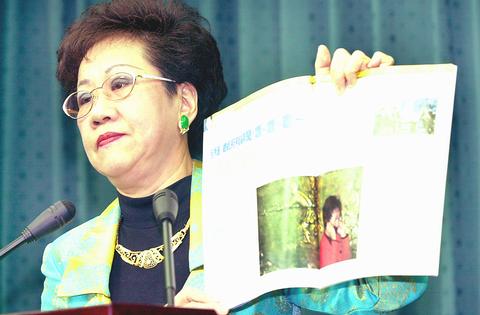The Taipei District Court (
However, Judge Lai Yung-hua's (
The dispute between The Journalist and Lu erupted in November 2000 when the magazine published a story accusing Lu of spreading a rumor that Chen was having an affair with one of his female aides. The magazine said Lu spread the rumor in order to unseat Chen.

PHOTO: GEORGE TSORNG, TAIPEI TIMES
Lu filed a civil suit on Dec. 21, 2000, demanding a formal apology from the magazine, saying the story had injured her reputation.
In addition to Yang, the lawsuit named as defendants The Journalist president Wang Chien-chuang (王健壯), executive president Jan Hung-chi (詹宏志), publisher Wang Hsing-ching (王杏慶) and reporters Yang Shu-mei (楊舒媚), Wu Yan-ling (吳燕玲) and Tao Ling-yu (陶令瑜).
In his verdict, Judge Lai acknowledged that Yang had lied about Lu calling him and telling him about the alleged affair and that he had also lied about having witnesses to back up the magazine's story.
However, Lai said the magazine was protected by the press freedom guaranteed by the Council of Grand Justices' constitutional Interpretation Number 509, which allows the press to propose proper questions about any suspicious fact or person. Therefore, he ruled that Yang was not guilty of libel.
Yang testified that Lu had called him on Nov. 13, 2000 and said that the president was having an affair. Yang said he had then told reporters Yang Shu-mei, Wu and Tao about the phone call and directed them to write about it.
In pre-trial hearings, Yang told the judge that Chen Shih-ning (
As for the other defendants, Lai ruled Wang Chien-chuang was not guilty because he was only in charge of administrative duties and had nothing to do with the magazine's stories. Jan was found not guilty because his title was simply an honorary one and he was not really working for the magazine. Wang Hsing-ching was found not guilty because his duties did not include editing the stories about Lu.
The three reporters were found innocent because the judge ruled they were only following orders in writing stories assigned to them by Yang.
However, Lai ruled that the story about Lu had damaged her reputation -- therefore, according to Article 188-1 of the Civil Code, Yang must "clarify and admit" his mistake. Lai ordered Yang to publish a clarification on the front pages of Taiwan's major newspapers as well as broadcast it on the radio and TV for three days.
"The case was about human dignity and press freedom," said Lai. "The court understood the defendants' jobs as media workers but we also considered Lu's reputation's as being damaged."
Lu claimed victory yesterday.
"The truth is the truth," Lu said. "No matter how Wang tried to argue and explain, he couldn't beat the truth."
She added that she appreciated the president's trust in her over this case.
Wang Chien-chuang said The Journalist actually won the suit.
"Why were those charges against the rest of us dropped?" said Wang. "That means we were always telling the truth. We will discuss an appeal on Yang's behalf with our lawyers."

PREPAREDNESS: Given the difficulty of importing ammunition during wartime, the Ministry of National Defense said it would prioritize ‘coproduction’ partnerships A newly formed unit of the Marine Corps tasked with land-based security operations has recently replaced its aging, domestically produced rifles with more advanced, US-made M4A1 rifles, a source said yesterday. The unnamed source familiar with the matter said the First Security Battalion of the Marine Corps’ Air Defense and Base Guard Group has replaced its older T65K2 rifles, which have been in service since the late 1980s, with the newly received M4A1s. The source did not say exactly when the upgrade took place or how many M4A1s were issued to the battalion. The confirmation came after Chinese-language media reported

A Ministry of Foreign Affairs official yesterday said that a delegation that visited China for an APEC meeting did not receive any kind of treatment that downgraded Taiwan’s sovereignty. Department of International Organizations Director-General Jonathan Sun (孫儉元) said that he and a group of ministry officials visited Shenzhen, China, to attend the APEC Informal Senior Officials’ Meeting last month. The trip went “smoothly and safely” for all Taiwanese delegates, as the Chinese side arranged the trip in accordance with long-standing practices, Sun said at the ministry’s weekly briefing. The Taiwanese group did not encounter any political suppression, he said. Sun made the remarks when

The Taiwanese passport ranked 33rd in a global listing of passports by convenience this month, rising three places from last month’s ranking, but matching its position in January last year. The Henley Passport Index, an international ranking of passports by the number of designations its holder can travel to without a visa, showed that the Taiwan passport enables holders to travel to 139 countries and territories without a visa. Singapore’s passport was ranked the most powerful with visa-free access to 192 destinations out of 227, according to the index published on Tuesday by UK-based migration investment consultancy firm Henley and Partners. Japan’s and

BROAD AGREEMENT: The two are nearing a trade deal to reduce Taiwan’s tariff to 15% and a commitment for TSMC to build five more fabs, a ‘New York Times’ report said Taiwan and the US have reached a broad consensus on a trade deal, the Executive Yuan’s Office of Trade Negotiations said yesterday, after a report said that Washington is set to reduce Taiwan’s tariff rate to 15 percent. The New York Times on Monday reported that the two nations are nearing a trade deal to reduce Taiwan’s tariff rate to 15 percent and commit Taiwan Semiconductor Manufacturing Co (TSMC, 台積電) to building at least five more facilities in the US. “The agreement, which has been under negotiation for months, is being legally scrubbed and could be announced this month,” the paper said,